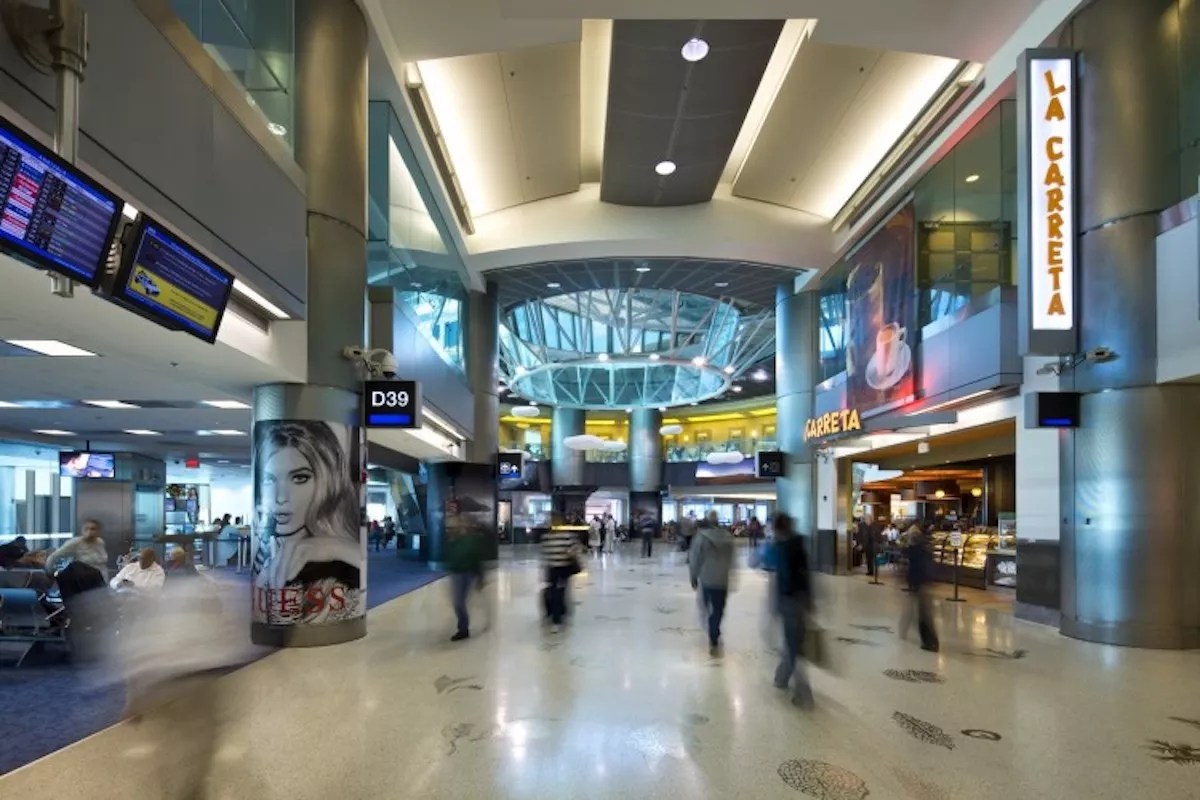
Miami International Airport photo

Audio By Carbonatix
A delegation of five Cuban nationals spent five hours touring security checkpoints, a baggage-screening zone, and other areas of Miami International Airport on May 20, triggering a wave of backlash from Florida congressmembers and Miami-Dade County leaders.
A U.S. State Department spokesperson pointed out that the Transportation Security Administration (TSA) “has cooperated with Cuba on civil aviation security for many years and has facilitated multiple such visits” since 2011.
The tour nonetheless seemed to catch Miami politicians on their heels – and the expressions of indignation multiplied swiftly.
On Wednesday, U.S. Rep. Carlos Giménez, a former Miami-Dade County mayor who takes a hardline stance on U.S.-Cuba relations, said he and his colleagues would be “launching an investigation, introducing legislation, and holding hearings” about the visit. He sent a letter denouncing the tour to TSA and the Department of Homeland Security, alongside fellow Florida Republican congressmembers: Sen. Marco Rubio, Sen. Rick Scott, Rep. Maria Elvira Salazar, and Rep. Mario Díaz-Balart.
“We write today to express our profound concern and outrage over the invitation and tour of Miami International Airport to members of the Cuban regime,” the letter (attached below) reads.
After grievances poured in over the visit, TSA’s regional spokesperson told Florida Politics the agency “works closely with its Cuban counterparts to promote civil aviation security in both countries.”
“This involves TSA inspecting Cuban airports to certify their ability to host flights to the United States, and occasional reciprocal visits by the Cuban transportation ministry to U.S. airports to demonstrate best practices. Cuban officials did not access sensitive technology or systems,” the spokesman said.
Ralph Cutié, director of the Miami-Dade Aviation Department, which oversees the airport, told local media that his office was not notified of the visit in advance and that he was taken aback by the lack of communication. The visit came on Cuba Independence Day, a day on which Cuban Americans celebrate the nation’s release from foreign occupation in 1902.
TSA confirmed Wednesday that Cuban officials had previously visited Miami International Airport in 2011 and 2015.
Stephanie Cepero, the vice president of Cuban Freedom March, a group that protests Cuba’s Communist government, tells New Times the visit put the U.S. in a “vulnerable position.”
“It is a country that is not one of our allies and that we clearly have had a long and tumultuous relationship with since Castro took over,” Cepero says. “I think they’re trying to make it seem like the Cuban government is cooperating with the U.S. to work against any issues of terrorism. What they’ve done is just generate more resentment.”
The congressmembers’ letter made note of a similar controversy sparked in February 2023, when the U.S. Coast Guard hosted members of Cuban government ministries at Coast Guard headquarters in Washington, D.C. and at a port in Wilmington, North Carolina. Giménez wrote that the move prompted Congress to add language to the 2024 National Defense Authorization Act to prohibit future port tours by Cuban officials.
“Yet again, Congress must step in to prevent your Department and the Biden Administration from hosting individuals from a country which our Department of State has listed as a [State Sponsor of Terrorism] since 2021,” the letter states.
Cuba’s spot on the State Sponsors of Terrorism (SSOT) list puts it in the ranks of North Korea, Syria, and Iran, in terms of national security designation. In 2015, then-president Barack Obama removed the island nation from the list, but Donald Trump’s administration subsequently redesignated it as an SSOT late in his presidency.
Washington Office on Latin America (WOLA), a progressive-leaning foreign policy group, called Cuba’s prior removal from the SSOT list “an important step forward” in “efforts to forge a more constructive relationship with Cuba.”
“The SSOT list might be an important tool for countering global terrorism, but its application in the case of Cuba is questionable at best. Beyond serving as political fodder, the designation also has tangible effects that make life for Cubans – both on and off the island – more difficult,” WOLA says.
A Surprise Visit?
Diario Las Américas published an article about the Cuban officials’ airport tour at around 6 p.m. the night of the visit, reporting that a source had directly contacted it regarding the visit.
A few hours later, Miami-Dade County Commissioner Kevin Marino Cabrera posted a statement on X, condemning the Biden administration’s decision to allow the tour. He called it “yet another example of a tone-deaf administration being manipulated by Cuban communists for a propaganda victory.”
Miami-Dade County Mayor Daniella Levine Cava wrote the following morning on her social media pages that she “was shocked to learn that a Cuban government delegation was invited to visit Transportation Security Administration (TSA) facilities at Miami International Airport.” Levine Cava said that she requested that the county and the Miami-Dade Aviation Department be included in future decision-making regarding delegate visits.
TSA maintained that the Cuban officials viewed “equipment that anyone screened at the checkpoint may view.”
“TSA officials at Miami International Airport have also welcomed dignitaries from Antigua, Barbados, Spain, and Brazil for similar visits recently,” the agency said.
The Miami metro area is home to the largest population of Cuban Americans in the U.S., and normalization of U.S.-Cuba relations is a political minefield for the Biden administration in South Florida. While advocates for foreign policy reform are calling for engagement with Cuba, many Cuban exiles and their families in the area are vehemently opposed to anything resembling détente.
The Biden administration announced in 2022 that it was taking some steps to normalize U.S.-Cuba relations, including expanding the range of flights allowed from the U.S. to Cuba and reinstating a family reunification program for Cubans seeking to come to the U.S. Still, many of the Trump-era hardline policies toward the island remain in place.
A few days before the Miami airport visit, the State Department removed Cuba from a list of nations “not fully cooperating” with counterterrorism efforts, though the island remained designated as an SSOT.